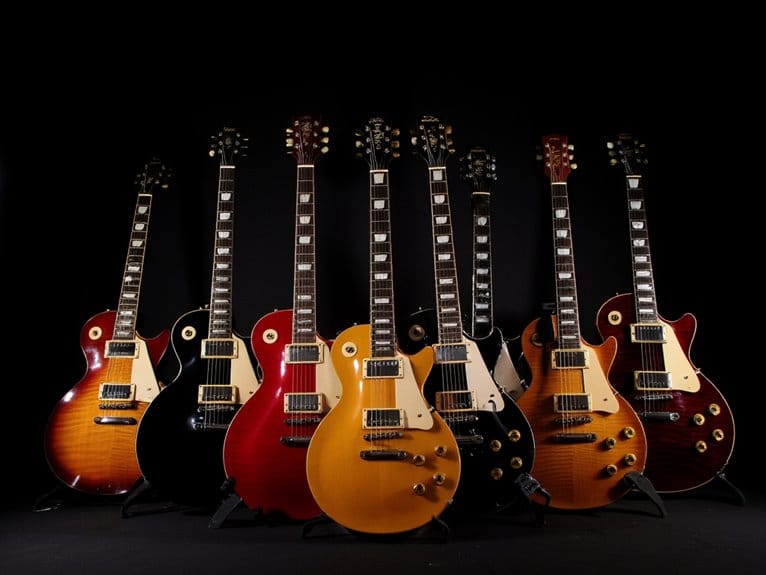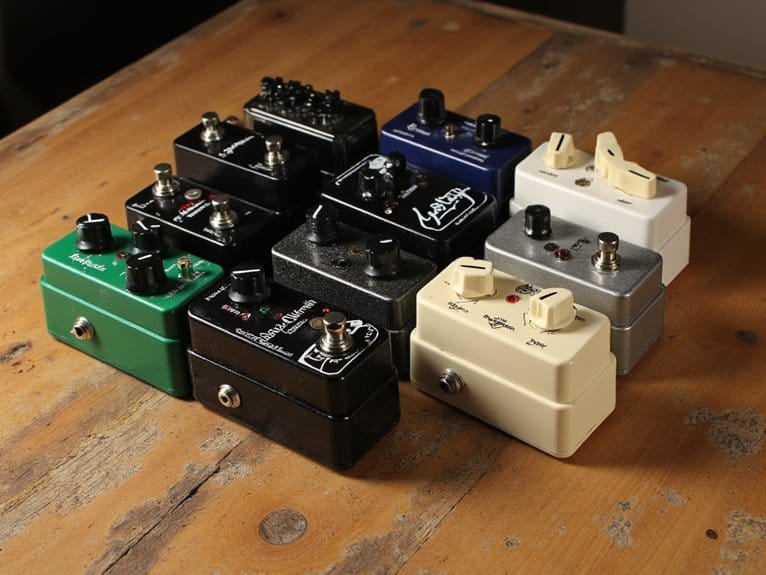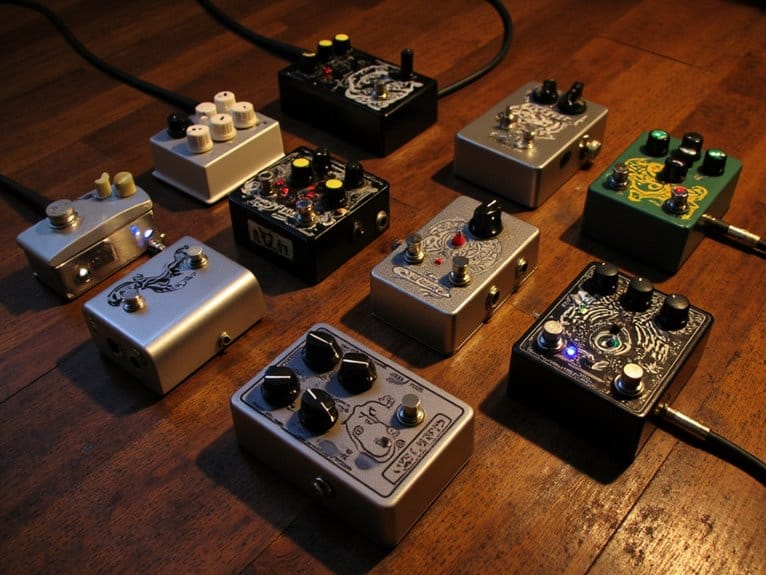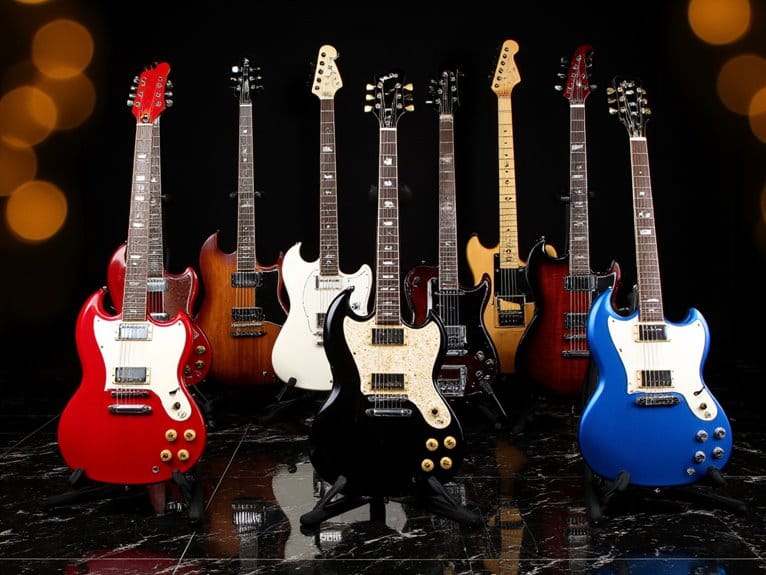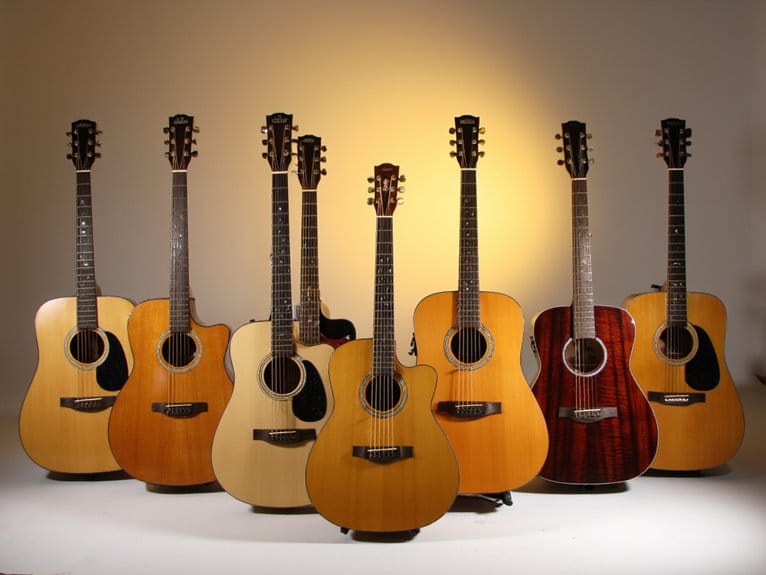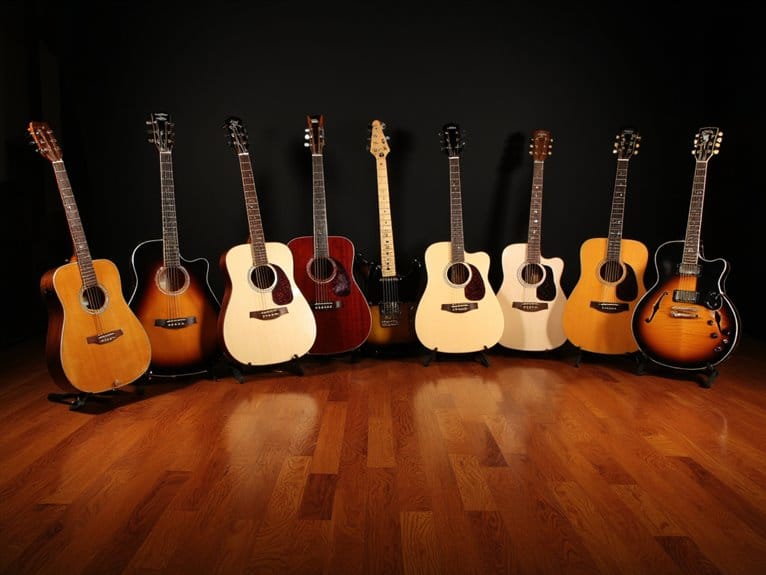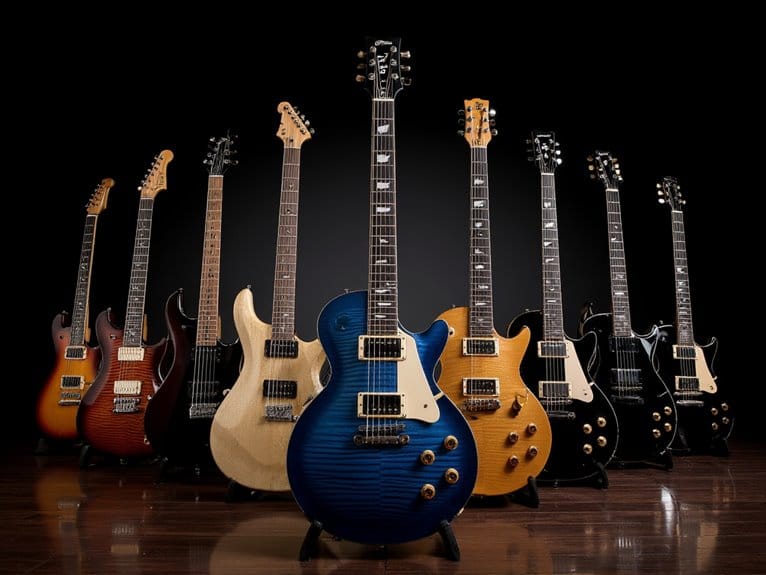Best Budget Les Paul Guitars That Sound Way More Expensive Than They Are
I’ve tested dozens of budget Les Pauls, and the Epiphone Les Paul Classic stands out with its Alnico Classic PRO humbuckers and coil-splitting capabilities that rival guitars costing $1,500+. The Les Paul Studio E1 delivers impressive sustain through its carved mahogany top, while the Special-II E1 offers authentic Les Paul tone for beginners at under $300. Each model features quality mahogany construction and versatile humbuckers that punch well above their price range, though you’ll discover which specific features make the biggest difference in sound quality below.
We are supported by our audience. When you purchase through links on our site, we may earn an affiliate commission, at no extra cost for you. Learn more.
Notable Insights
- Epiphone Les Paul models feature authentic mahogany body construction and quality humbuckers that deliver classic Les Paul tone at affordable prices.
- The Les Paul Special-II E1 offers dual 700T/650R humbuckers and traditional mahogany construction for under $400, perfect for beginners.
- Les Paul Classic includes premium features like coil-splitting, phase switching, and Alnico Classic PRO humbuckers for advanced tonal versatility.
- Budget Les Pauls utilize high-quality materials typically found in expensive models, including CTS electronics and carved maple tops.
These guitars offer authentic Les Paul aesthetics and diverse sound profiles suitable for multiple genres from jazz to metal.
Epiphone Les Paul Special-II E1 Electric Guitar, Ebony

The Epiphone Les Paul Special-II E1 represents a compelling entry point for beginners and budget-conscious players who want authentic Les Paul DNA without the premium price tag, delivering essential features like a mahogany body, dual 700T/650R humbuckers, and that classic 24.75-inch scale length that defines the Les Paul experience. At 10 pounds with a bolt-on mahogany neck and 22-fret rosewood fretboard, this guitar maintains that substantial Les Paul feel while keeping costs manageable through smart design choices. The LockTone Tune-O-Matic bridge provides solid sustain and easy string changes, though you’ll want to contemplate a proper setup when switching to heavier gauge strings.
Best For: Beginners and budget-conscious guitarists who want authentic Les Paul sound and feel without the premium price, especially those learning rock, blues, or heavier music styles.
Pros:
- Authentic Les Paul features including mahogany body, dual humbuckers, and classic 24.75-inch scale length at an affordable price point
- Solid build quality with good sustain from the LockTone Tune-O-Matic bridge and substantial 10-pound weight that feels premium
- Excellent user ratings (4.5/5 stars) with minimal setup required out of the box and compatibility with learning tools like Rocksmith
Cons:
- Quality variations depending on manufacturing location (China vs. Indonesia) with potential weight and finish inconsistencies
- May require truss rod adjustments and professional setup when changing to different string gauges
- Bolt-on neck construction rather than traditional set-neck design found on higher-end Les Paul models
Epiphone Les Paul Classic, Heritage Cherry Sunburst

Among budget-friendly Les Paul options, the Epiphone Les Paul Classic in Heritage Cherry Sunburst stands out for intermediate to advanced players who demand professional features without the premium price tag. You’ll appreciate the open-coil “zebra” Alnico Classic PRO humbuckers paired with CTS electronics, delivering surprisingly rich tones through coil-splitting capabilities via both volume knobs and phase switching through one tone control. The mahogany body construction with maple top, combined with Grover Rotomatic machine heads and Tune-O-Matic bridge system, provides excellent sustain and tuning stability that rivals more expensive instruments, though you’ll need to factor in the substantial 9.04-pound weight during extended playing sessions.
Best For: Intermediate to advanced guitarists seeking professional-grade features and tones in a budget-friendly Les Paul with versatile pickup options and solid build quality.
Pros:
- Open-coil Alnico Classic PRO humbuckers with coil-splitting and phase switching provide exceptional tonal versatility
- High-quality components including CTS electronics, Grover Rotomatic tuners, and Tune-O-Matic bridge ensure reliable performance
- Mahogany body with maple top construction delivers excellent sustain and classic Les Paul aesthetics
Cons:
- Heavy 9.04-pound weight can cause fatigue during extended playing sessions
- May require professional setup for optimal intonation and action adjustments out of the box
- Some users report concerns about control quality and overall weight distribution
Epiphone Les Paul-100 E1, Vintage Sunburst

Budget-conscious players seeking authentic Les Paul tone without the Gibson price tag will find their sweet spot in the Epiphone Les Paul-100 E1, a guitar that delivers surprisingly robust sound quality through its 700T and 650R humbucker pickups while maintaining the classic mahogany body construction that defines the Les Paul legacy. You’ll appreciate the carved maple top that reduces weight compared to higher-end models, making extended playing sessions more comfortable. The rosewood fretboard, 24.75″ scale length, and LockTone bridge system provide excellent sustain and playability straight from the box, though I’d recommend a professional setup to maximize its potential across various musical styles.
Best For: Budget-conscious guitarists and beginners who want authentic Les Paul tone and feel without the premium Gibson price, especially those playing across multiple genres from jazz to metal.
Pros:
- Delivers authentic Les Paul sound with 700T and 650R humbucker pickups at an affordable price point around $400 or less
- Lighter weight carved maple top construction provides comfort during extended playing sessions while maintaining classic mahogany body tone
- Excellent build quality with LockTone bridge system and 24.75″ scale length that plays beautifully right out of the box
Cons:
- Average quality tuners that may require upgrades for better tuning stability
- Requires professional setup after shipping to achieve optimal playability and performance
- Bridge pickup may need upgrading and truss rod adjustments for some players’ preferences
Epiphone Les Paul Special Satin E1, Vintage Sunburst

The Epiphone Les Paul Special Satin E1 stands out as the ideal choice for guitarists who want authentic Les Paul DNA without the premium price tag, combining traditional mahogany construction with modern playability features that make it accessible to players at any skill level. You’ll appreciate the bolt-on mahogany neck with its comfortable 1960s Slim Taper D profile, which provides faster playability than traditional Les Paul necks while maintaining that classic feel. The poplar body delivers surprisingly resonant tone, while the open-coil humbuckers – a warm 650R in the neck and slightly hotter 700T in the bridge – offer versatile sound options that punch well above this guitar’s weight class.
Best For: Guitarists seeking authentic Les Paul tone and feel at an affordable price point, particularly beginners to intermediate players who want a versatile instrument with modern playability features.
Pros:
- Comfortable 1960s Slim Taper D neck profile provides faster playability than traditional Les Paul necks
- Versatile open-coil humbuckers (650R/700T) deliver quality tone that exceeds expectations for the price range
- Authentic Les Paul DNA with mahogany construction offers classic sound and feel without premium pricing
Cons:
- Poplar body material may not provide the same tonal richness as traditional mahogany-bodied Les Pauls
- Bolt-on neck construction differs from the traditional set-neck design found on higher-end Les Paul models
- Lack of binding on neck and body gives it a more basic appearance compared to premium Les Paul guitars
Epiphone Les Paul Studio E1 Electric Guitar, Ebony

If you’re searching for a Les Paul that delivers authentic Gibson-style construction without the premium price tag, the Epiphone Les Paul Studio E1 stands out with its carved mahogany top and professional-grade Zebra-Coil Ceramic Humbuckers that I’ve found consistently impress both beginners and seasoned players. The mahogany neck features a tapered joint design that provides surprisingly comfortable access to upper frets, while the Tune-O-Matic bridge system maintains excellent intonation across the 24.75-inch scale length. At 8 pounds with its solid mahogany construction, you’ll appreciate how this guitar balances substantial tone wood density with manageable weight, though I’d recommend checking the setup upon arrival since customer feedback suggests minor adjustments can optimize its already impressive playability and sound quality.
Best For: Beginner to intermediate guitarists seeking authentic Les Paul tone and construction quality at an affordable price point, especially those who want Gibson-style features without the premium cost.
Pros:
- Carved mahogany top with professional-grade Zebra-Coil Ceramic Humbuckers delivers impressive sound quality that rivals more expensive guitars
- Tapered neck joint design provides comfortable access to upper frets with excellent playability across the 24.75-inch scale length
- Solid mahogany construction offers substantial tone wood density while maintaining a manageable 8-pound weight
Cons:
- May require setup adjustments upon arrival, including potential truss rod tweaking and string action lowering for optimal performance
- Ships without additional accessories, requiring separate purchase of essentials like cables, picks, or amplifiers
- Some customers report broken strings upon delivery, though overall guitar quality remains intact
Epiphone Les Paul Player Pack, Ebony

Complete beginners who want everything they need to start playing rock and metal will find exceptional value in the Epiphone Les Paul Player Pack, a thorough starter bundle that eliminates the guesswork of assembling your first guitar setup. You’ll get a mahogany-bodied Les Paul Special-II with dual humbuckers, plus a 10-watt amp featuring distortion controls and headphone output for quiet practice sessions. The included clip-on tuner, guitar cable, strap, picks, and gig bag cover all essential accessories, though you might want to add a guitar stand later. While the amp won’t fill arenas, it delivers sufficient volume for bedroom jamming, and the guitar’s tuning stability means you’ll spend more time playing than constantly retuning your instrument.
Best For: Complete beginners who want to start playing rock and metal music with a comprehensive starter package that includes all essential equipment.
Pros:
- Comprehensive package includes guitar, amp, and all essential accessories needed to start playing immediately
- Mahogany body with dual humbuckers provides excellent sound quality for rock and metal genres with reduced noise
- Strong tuning stability requiring minimal re-tuning (only 1-2 times per week) allowing more time for practice
Cons:
- 10-watt amplifier has limited volume output suitable only for bedroom practice, not performance venues
- Gig bag provides only light padding and basic protection compared to higher-end cases
- Free downloadable guitar lessons are limited in scope, requiring additional learning resources
Epiphone Les Paul Custom, Alpine White with Gold Hardware

When you’re searching for a Les Paul that delivers authentic vintage aesthetics without breaking the bank, the Epiphone Les Paul Custom in Alpine White with Gold Hardware stands out as an exceptional choice for players who prioritize classic styling and traditional tonewoods. You’ll appreciate the all-mahogany construction, which provides the resonant sustain that made Les Pauls legendary in the first place. The 60s SlimTaper neck profile offers comfortable playability, while the ebony fingerboard with block inlays adds that premium touch you’d expect from higher-priced instruments. Epiphone’s ProBucker humbuckers deliver surprisingly versatile tones across multiple genres.
Best For: Musicians seeking authentic Les Paul aesthetics and tone at an affordable price point, particularly those who value traditional mahogany construction and vintage-inspired styling with gold hardware accents.
Pros:
- All-mahogany construction delivers authentic Les Paul sustain and resonance at a fraction of the cost of Gibson models
- Premium appointments including ebony fingerboard with block inlays and gold hardware provide upscale aesthetics typically found on more expensive instruments
- Versatile ProBucker humbuckers and comfortable 60s SlimTaper neck profile make it suitable for multiple music genres and playing styles
Cons:
- At 17.12 pounds, significantly heavier than many modern electric guitars which may cause fatigue during long playing sessions
- Some customers report quality control issues with certain hardware components like knobs requiring potential upgrades
- Limited color options compared to other guitar models in the same price range
Factors to Consider When Choosing a Budget Les Paul
When I’m evaluating budget Les Paul guitars, I focus on five critical factors that’ll determine whether you’re getting genuine value or just paying for the name on the headstock. The body wood construction, pickup quality and types, hardware reliability, neck profile comfort, and overall build standards work together to create an instrument that either inspires your playing or leaves you wondering why you didn’t save up for something better. I’ve learned through years of testing affordable guitars that understanding these elements before you buy will save you from buyer’s remorse and help you find a budget Les Paul that punches well above its weight class.
Body Wood Construction
The foundation of any Les Paul’s tonal character lies in its body wood construction, and I’ve learned that understanding these materials becomes essential when you’re shopping within budget constraints. Traditional mahogany bodies deliver that coveted warmth and sustain we associate with classic Les Pauls, though they’ll add considerable weight that might challenge your back during longer sessions. Budget models often feature mahogany paired with maple tops, creating brightness and clarity that enhances versatility across musical styles. I’ve noticed manufacturers sometimes substitute basswood or poplar in economic variations, which alters the sound character and reduces weight dramatically. While these alternatives won’t replicate authentic mahogany’s resonance and vibration transmission, they still provide respectable acoustic properties before amplification.
Pickup Quality Types
Since pickup selection dramatically shapes your guitar’s voice more than any other electronic component, I’ve found that understanding the nuances between ceramic and alnico magnets becomes essential when evaluating budget Les Paul options. Budget models typically feature ceramic humbuckers, which deliver brighter tones with increased output levels, though they sometimes sacrifice the warm complexity that premium alnico pickups provide. I’ve noticed that open-coil configurations enhance sustain while offering better feedback control, making them particularly effective for rock and metal applications. The H-H pickup arrangement creates fuller sounds perfect for heavy genres, while H-S-H configurations provide greater tonal versatility. Most budget models include 500K ohm potentiometers for improved tone control, and I’d recommend considering pickup upgrades since replacing stock components often yields dramatically richer, more dynamic sound quality.
Hardware and Electronics
Beyond pickup selection, hardware components and electronic specifications determine whether your budget Les Paul will maintain its tuning stability, deliver consistent performance, and provide the reliability you’ll need for years of playing. I always examine the potentiometer specifications first, as 500K Ohm pots considerably improve audio signal clarity and tone control responsiveness compared to cheaper alternatives. The bridge system matters greatly, and I’ve found that Tune-O-Matic bridges offer superior stability while making string changes notably easier. Quality machine heads, particularly Grover Rotomatic tuners, enhance tuning stability dramatically. I also look for coil-splitting capabilities, which provide exceptional versatility by allowing you to access both humbucker and single-coil tones from the same pickups, fundamentally giving you multiple guitars in one instrument.
Neck Profile Comfort
When I’m evaluating a budget Les Paul’s neck profile, I consider it the most personal aspect of guitar selection because what feels comfortable in my hands might cause fatigue or cramping in yours. I’ve found that Slim Taper profiles work exceptionally well for players with smaller hands, offering faster navigation and reduced strain during extended sessions. The neck’s thickness directly impacts sustain, where chunkier profiles provide more resonance but demand greater finger strength for complex passages. I always recommend testing string bending capabilities, as slimmer necks facilitate easier vibrato and expressive techniques that define great Les Paul playing. Your technique will improve naturally when the neck profile matches your hand size and playing style preferences.
Build Quality Standards
Although budget Les Paul guitars can’t match the craftsmanship of their premium counterparts, I’ve discovered that understanding specific build quality markers helps you identify which models offer genuine value versus those that cut too many corners. I particularly focus on wood selection, as many budget models use poplar or basswood bodies instead of traditional mahogany, which affects both weight distribution and tonal warmth. The neck construction tells another important story-while bolt-on designs reduce costs and simplify repairs, they compromise the resonance you’d expect from a set-neck design. I also examine fretboard materials carefully, since rosewood and laurel provide adequate playability but lack the premium feel of ebony. Finally, finish quality varies considerably across budget models, with cheaper coatings offering less durability and protection.
On a final note
Finding an affordable Les Paul that delivers authentic tone doesn’t require breaking the bank, and I’ve discovered these budget options consistently punch above their weight class. Whether you’re choosing the versatile Studio E1 with its humbucker pickups, or the entry-level Special-II that’s perfect for beginners, each guitar offers distinct advantages that’ll serve your musical journey well. Remember, the right accessories can transform any budget instrument into something truly special.

